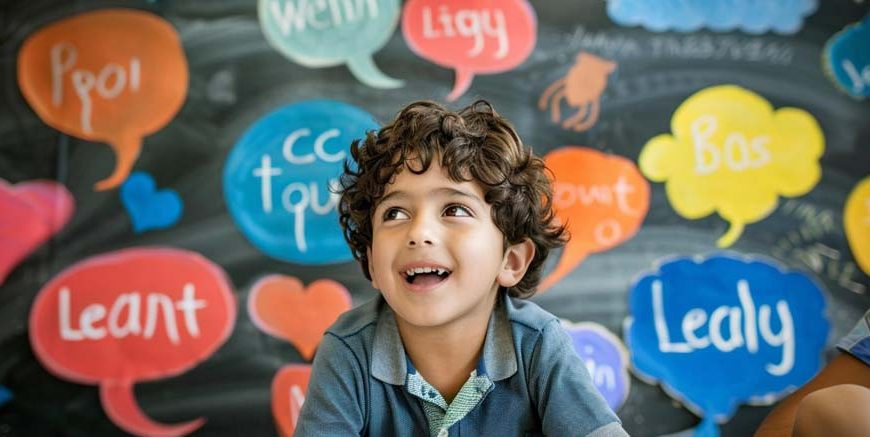Building a Strong Language Foundation Early
Language is the foundation of communication, and learning it early makes all the difference. For young learners, especially kids in KG and Class 1, starting with small sentences in English helps them understand the language naturally. These short, simple sentences are easy to memorise and encourage children to speak confidently.
Early exposure to English improves listening, comprehension, and social interaction. When children use small English sentences in daily life, whether greeting someone, asking for help, or describing their feelings, it builds their confidence step by step. For parents, it’s not just about teaching words, but helping children express themselves clearly.
At EuroKids, language development is a key part of early learning. Through interactive activities, storytelling, and play-based education, children learn to speak fluently while enjoying every moment of it. Their programme help children not only build vocabulary but also develop essential social and emotional skills.
Importance of Small Sentences for Kids
Small sentences act as the building blocks of language. They introduce children to the structure of communication in a way that feels natural and enjoyable. When a child says, “I am happy” or “This is my toy,” they are learning more than just words, they are developing clarity and emotional awareness.
Using small sentences in English for kids strengthens reading and writing fluency. It teaches them to form thoughts, express needs, and interact socially. For KG and early learners, repetition and everyday use are key. Whether it’s at home, in school, or at play, small sentences become a part of their thinking process.
Consistent exposure to small English sentences for daily use ensures that children become comfortable with pronunciation and grammar without feeling overwhelmed. It’s an organic way to help them think in English rather than translating from their mother tongue.
Read More – Fun Tongue Twisters for Kids to Improve their Pronunciation
How to Teach Small Sentences to Kids
Teaching children small sentences in English doesn’t have to be challenging. It can be a joyful experience for both parents and teachers when combined with creativity and patience.
Visual aids like flashcards or picture books make sentence learning exciting. Storytelling allows children to understand context, “The cat is sleeping” becomes meaningful when they see the picture. Singing rhymes, acting out actions, or using simple games like “Simon Says” are effective tools.
Encouraging children to speak daily, “Can I have water?”, “Let’s play outside”, “I love my mummy”, helps with fluency. EuroKids follows a similar play-based approach, where teachers integrate conversation into songs, group play, and phonics sessions. The goal is to make small sentences in English for kids a natural part of their environment.
H2: 150+ Small Sentences in English for Kids to Learn and Practise
Daily Use Sentences in English for Kids
- Good morning!
- How are you?
- I am fine.
- What is your name?
- My name is Riya.
- I am going to school.
- I love my family.
- The sun is shining.
- I am hungry.
- Let’s eat lunch.
- I like apples.
- It’s time to sleep.
- I am feeling happy.
- The room is clean.
- I want water.
- Please open the door.
- I can read this.
- Today is Monday.
- The bird is flying.
- Thank you very much.
- I will do my homework.
- The bell is ringing.
- I see a rainbow.
- It is raining.
- Let’s go outside.
Read More – Simple Words for Kids: Building a Strong Vocabulary
Small Sentences in English for Kids at Home
- Mummy is cooking food.
- Papa is reading a book.
- I like helping my mother.
- The baby is sleeping.
- My room is small.
- Please turn on the fan.
- I am watching TV.
- I love my grandparents.
- My sister is playing.
- I am cleaning my toys.
- The table is round.
- The floor is cold.
- Please close the window.
- I am brushing my teeth.
- The milk is hot.
- I like my home.
- My father is tall.
- The dog is barking.
- Let’s eat dinner together.
- I am folding my clothes.
- My bed is soft.
- I like my doll.
- I am painting a picture.
- Grandma told me a story.
- We are watching a movie.
Read More – Fun Spelling Games & Activities for Kids
Small Sentences in English for School or Classroom
- The teacher is writing.
- I am reading my book.
- May I come in, ma’am?
- The class is quiet.
- I am learning maths.
- Please give me a pencil.
- The board is green.
- I like my school.
- I am drawing a cat.
- Please stand in line.
- The bell has rung.
- We are singing a song.
- My teacher is kind.
- I am writing my name.
- I like my friends.
- The lunch break is over.
- I am wearing my uniform.
- The book is on the table.
- May I drink water?
- Let’s read together.
- I finished my homework.
- I can spell my name.
- The classroom is bright.
- I am learning English.
- I love my teacher.
Also Read – Commonly Confused Words in English for Kids
Small Sentences in English for Kids at Playtime and Outdoor Activities
- Let’s play cricket.
- The ball is round.
- I can run fast.
- The park is big.
- I am flying a kite.
- My shoes are dirty.
- The grass is green.
- Let’s ride our bicycles.
- I am jumping high.
- The slide is long.
- I am skipping rope.
- The sun is bright.
- I can kick the ball.
- I fell down.
- The swing is fun.
- My friend is running.
- The sky is blue.
- Let’s play hide and seek.
- I caught the ball.
- We are having fun.
- The air is cool.
- I am blowing bubbles.
- The water is cold.
- I won the game.
- We are clapping.
Read More – Illustrated Idioms for Kids: Fun Explained Examples
Small English Sentences for Good Manners and Habits For Childrens
- Please say thank you.
- Always say sorry.
- Don’t shout.
- Be kind to everyone.
- Help your friends.
- Wash your hands.
- Keep your room clean.
- Don’t waste food.
- Share your toys.
- Listen to your teacher.
- Brush your teeth daily.
- Always be honest.
- Respect elders.
- Say goodnight before bed.
- Speak politely.
- Don’t push others.
- Help your parents.
- Be a good child.
- Say please when you ask.
- Smile every day.
Read More – Engaging English Grammar Rules for Kids
Small English Sentences for Stories and Imagination For Students
- The fairy is flying.
- The dragon is sleeping.
- The king is brave.
- The princess is kind.
- The lion is roaring.
- The moon is smiling.
- The stars are shining.
- The rabbit is running.
- The forest is quiet.
- The bird is singing.
- The fish is swimming.
- The cloud is white.
- The sun is happy.
- The baby laughed.
- The rainbow is bright.
- The boy found a treasure.
- The cat is talking.
- The dog saved the day.
- The hero won the race.
- The story is magical.
Read More – Compound Sentences With Examples For Kids
Small English Sentences for Daily Use (Class 1 & KG Kids)
- I can do it.
- This is my book.
- That is your pencil.
- He is my friend.
- She is reading.
- It is very cold.
- I am tired.
- We are going out.
- You are my best friend.
- They are playing together.
- I like to draw.
- It’s time to study.
- I am eating fruits.
- We are singing.
- I can jump.
- This bag is heavy.
- That doll is pretty.
- The ice cream is tasty.
- The bird is small.
- I love to learn.
Also Read: Simple Sentence Building Activities for Kids
Benefits of Using Small English Sentences Daily
Practising small sentences in English daily helps children gain confidence in communication. It sharpens pronunciation, improves grammar naturally, and strengthens memory through repetition. When kids use these sentences at home, school, and during play, it enhances their understanding of social situations.
This daily practice boosts their confidence in public speaking and classroom participation. It also helps them think in English instead of translating from their mother tongue, a skill that grows with age.
EuroKids understands that fluency begins with small steps. That’s why its curriculum blends reading, speaking, and storytelling to make every child a confident communicator.
Why Parents Prefer EuroKids for Early English Learning
EuroKids has become a trusted name in early childhood education because of its focus on language development and overall growth. Its child-first curriculum integrates play-based learning with structured teaching, helping children learn effortlessly.
Each EuroKids classroom is designed to encourage speaking, listening, and expression. Teachers guide children through stories, songs, and conversations, making English an everyday experience rather than a subject.
With over 1,200+ preschools across 350+ cities in India and more than 20 years of trust, EuroKids stands as the best preschool franchise in India. Its success model inspires many aspiring entrepreneurs to start their own preschool franchise in India, contributing to quality education nationwide.
Also Read: English Learning Games
FAQs on Small Sentences in English for Kids
1. How can I teach my child small sentences in English at home?
Start by using simple daily expressions like “Good morning” or “I am eating.” Read short storybooks and engage them in small conversations throughout the day.
2. What are some easy daily-use English sentences for kids?
Sentences like “I am happy,” “Please help me,” or “The sky is blue” are great for beginners.
3. At what age should a child start speaking in English sentences?
Most children start forming small sentences by the age of 3–4. With guidance, they can become fluent by 6.
4. How do EuroKids teachers help children learn English naturally?
EuroKids teachers use interactive methods like role-play, rhymes, and storytelling to make English fun and intuitive.
5. Why are small sentences important in early education?
They build vocabulary, improve communication skills, and prepare children for advanced reading and writing.
Build Your Future with EuroKids
Are you passionate about early education and child development? Join the EuroKids family, India’s most trusted preschool network, and contribute to shaping brighter futures. Explore the EuroKids Franchise Business Opportunities to start your entrepreneurial journey in education. Empower children to speak, learn, and grow confidently with EuroKids.
Conclusion
Building a child’s communication skills begins with simple, meaningful steps, and learning small sentences in English is one of the most effective ways to start. These easy sentences not only enhance vocabulary and pronunciation but also help children express thoughts clearly and confidently in everyday life. Whether it’s greeting someone, asking questions in class, or sharing their favourite story, small sentences give kids the foundation to speak fluently and think creatively.
At EuroKids, the focus on early language development ensures that every child learns English in a fun, engaging, and age-appropriate way. Through play-based methods and structured classroom interactions, children gradually gain command over communication while enjoying every bit of the process. For more such content you can visit EuroKids Blog.
Related Blogs
Everyday Vocabulary for Children: Fundamental and Easy Words for Kids
Help your little one build a strong language base with this guide on essential everyday words. It’s perfect for parents who want to make vocabulary learning engaging and interactive at home.
Most Important Things Kids Learn in Preschool
Discover the vital lessons beyond ABCs and 123s that shape a child’s emotional, social, and intellectual growth in their early years. Learn how preschool sets the foundation for lifelong learning.
The Ultimate Guide to Teaching High Frequency Sight Words to Children
Make reading easier and more enjoyable for your child with practical tips for teaching sight words, the key to faster reading fluency and comprehension.
















